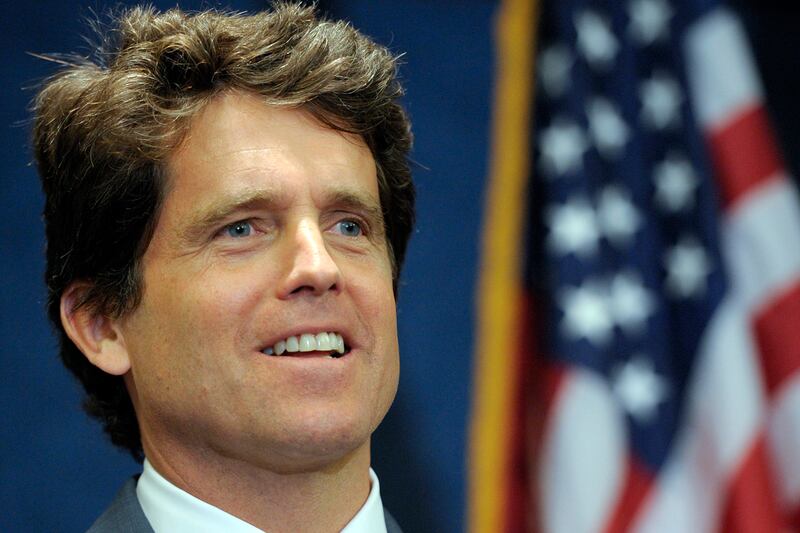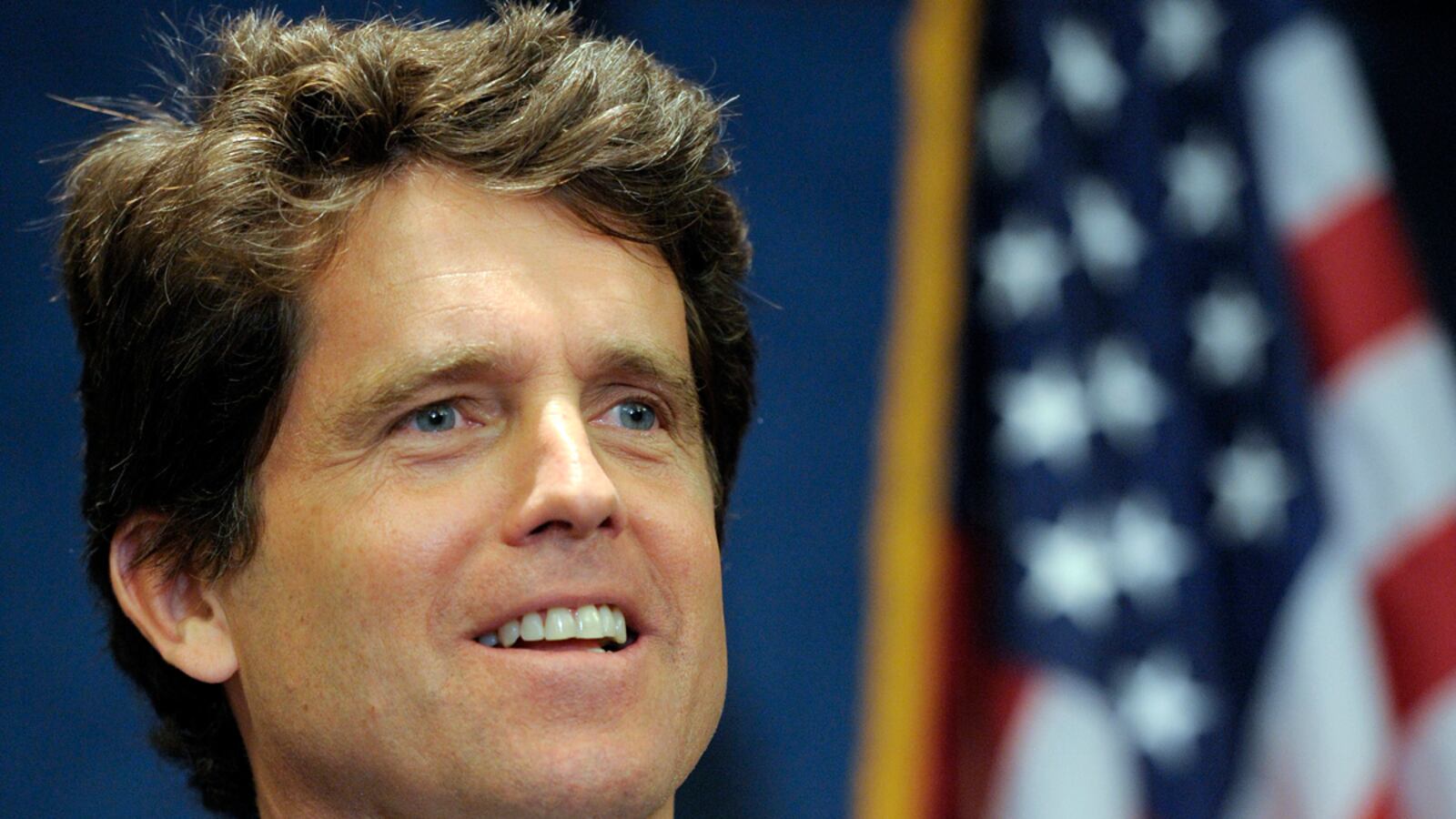It’s hardly news that the Kennedy family has paid an unreasonably high price—in lives lost and broken, grave illnesses, a criminal trial, and various scandals, all suffered in public—for the advantages of being rich, good-looking, and politically powerful.
Yet one branch, the Shrivers, has been mercifully excluded from the so-called Kennedy Curse.
Sargent Shriver, happily married for 56 years to Eunice, a younger sister of President Kennedy, lived a fabulously eventful and rewarding life until he was 95, only the last small slice of it hobbled by Alzheimer’s. Eunice Kennedy Shriver made it all the way to 88, productive and sharp till the end. Their five children all made their mark, started families of their own, and continue to enjoy personal and career successes.
“My father called us ‘The Lucky Seven,’ and we had a 24-foot motorboat by that name,” says Mark Shriver, the fourth child. “He used to say, ‘I’m the luckiest sonovabitch ever. I love my wife. I got five healthy kids.’ Growing up, I thought, God, he’s just crazy. But as I got older, I thought, he’s absolutely right. The only thing I would change is that it’s not lucky, it’s blessed.”
Shriver, 48, holds forth in an otherwise empty hotel bar, nursing a vodka tonic (from which he takes three sips and then pours the rest into my glass: “I have to give a speech tonight,” he sheepishly explains). Tall, slim, and well-tailored, this abstemious father of three—who’s getting ready to celebrate his 20th wedding anniversary in a couple of weeks—bears little resemblance to the chubby, rambunctious 11-year-old I met in 1975, when I was volunteering in his dad’s long-shot presidential campaign.

Three years earlier, Sarge, who’d been Lyndon Johnson’s ambassador to France and head of the vaunted War on Poverty, had been George McGovern’s running mate in the doomed 1972 campaign against Richard Nixon, when Sen. Tom Eagleton was forced off the ticket after belatedly admitting to electroshock treatments.
Now Sarge’s son has written A Good Man, an affectionate tribute not only to his famous father but also to his formidable mother—who, among other accomplishments, between them launched the Peace Corps and the Special Olympics—as well as a bittersweet memoir of growing up amid America’s ferociously competitive “royal” family, and a painfully honest account of taking care of a loved one who’s losing his mind.
“Every family struggles with different things and everybody struggles with different things,” Shriver says when I ask if airing some very private troubles ever gave him pause. “Some kids are fat kids, some kids are skinny kids. Some are part of the in-crowd, some are not. Everybody’s got insecurities and problems, and for me, putting it on paper wasn’t that big a deal. My wife [Jeanne] still loves me. My kids [Molly, Tommy, and Emma] love me.” He chuckles. “They’re gonna love me anyway.”
Because he lived close to his parents in the posh Washington suburb of Potomac, Md., Mark took on the management of their medical and legal issues, which multiplied as old age—especially his dad’s dementia—had its way. At times he doubted he possessed the necessary courage.
“It’s hard work whenever you’re dealing with someone you love and they’re fading away, and they’re less and less able to construct a sentence every week,” he says. “There were a lot of times I ran out of energy and relied on my wife and my kids and on Timmy [Mark’s older brother] and his wife and kids. I couldn’t have done it without them, and I’d hope they’d say the same thing to me. And Maria and Anthony and Bobby all contributed in different ways. It was really a team thing.”
Shriver, who for the past nine years has been a top executive for Save the Children, a nonprofit that runs literacy and healthy-lifestyle services for 75,000 schoolkids in 20 states, writes about a gnawing sense of inadequacy—never mind that his personal achievements include launching a program to keep troubled inner-city Baltimore youths on the straight and narrow, and serving eight years in the Maryland legislature. It was a crushing defeat, he writes, when he lost a 2002 bid to fellow Democrat Chris Van Hollen to be Maryland’s 8th district congressman.
“There are a lot of expectations,” he says about being a Kennedy. “If you think about it, there was a presidential race that the family was involved in from 1956 until 1980. That’s 24 years where somebody’s running to be the head of the most powerful country in the world or vice president, and that’s not even counting Senate races. So there’s a lot of tension, a lot of focus on that, a lot of people who were doing a lot of big things on a big stage. And if you had your own idea, you had to put it in the context of that relationship. And that’s hard to do if you’re a kid going through adolescence. To figure all that out is complicated.”
Through it all, Shriver writes, his father was both his most enthusiastic cheerleader and most influential role model.
“He lived essentially the history of the 20th century,” he says, noting that Sarge’s genteel family went bankrupt during the Great Depression and then Sarge saw combat while serving on a Navy submarine during World War II. He had been chairman of the Yale Daily News and after the war was an editor at Newsweek before his father-in-law, Joseph Kennedy, tapped him to run the Merchandise Mart in Chicago.
He helped integrate that city’s Catholic schools and became friends with Martin Luther King Jr. It was Sarge, in 1960, who got JFK, against the advice of cautious campaign operatives, to phone Coretta Scott King when her husband was jailed in Atlanta—a risky call that ended up swaying the black vote to Kennedy. He consistently stifled his own political ambitions to serve his brother-in-law—creating the Peace Corps instead of running for governor of Illinois—and might have been LBJ’s vice president had not President Johnson’s complex and troubled relations with the family (namely his bitter feud with attorney general Robert Kennedy) intervened. He might have also been Hubert Humphrey’s running mate in 1968.
Indeed, some historians claim the Kennedys actively thwarted Shriver’s political career—a claim his son mentions but doesn’t necessarily credit.
“My father never talked to me about it—that’s why I didn’t take a position. So I never say historically that it did or didn’t happen,” Shriver tells me. “He never thought about it. He never complained about it. He never said to me or to any of my friends, after he’d had a drink, ‘I got shortchanged.’ Or ‘screwed.’ None of that.”
Shriver adds: “When you get married in 1953, you know that Jack had been elected to the Senate, and I assumed he knew that he was getting into a family that was very driven. The great thing about him is he didn’t care about his own legacy. He never talked about it, because it was never about the past with him. It was always about the future and how exciting the future could be if we worked together. It was eternal optimism.”
Eunice, who died in August 2009, a year and half before her husband, was in the same mold—and fiercely supportive of her children. Whenever Maria Shriver published a new book, “My mom would go from Barnes & Noble to Borders, would literally grab 10 copies of Maria’s book, walk right up to the cash register in front, take the other books off the display and put Maria’s books there," Mark says. "That’s how she spent her Saturdays and Sundays.”
Notably absent from a book that celebrates family is any reference to Arnold Schwarzenegger, the Shriver clan’s least favorite in-law. Maria’s conspicuously unfaithful spouse is simply not mentioned.
“He’s not?” Shriver parries with a laugh.
Maria is doing just fine, he adds. “She’s got a new place, she’s got four beautiful kids and she’s strong and supported and loved by her family,” Shriver says. “She’s got a lot of friends and four brothers who are really supportive of her, and kids who’ve got a lot of cousins who love her kids. And that’s what’s gonna keep her strong—and all of us strong. That’s what’s important.”






